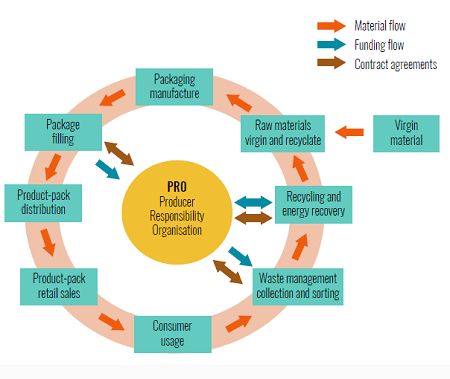
Extended Producer Responsibility (EPR) is a resource management tool whereby producers maintain the responsibility for their products and packaging to the end-of-life management of their used products. This can include collection, sorting and treatment for recycling and recovery.
In practice, most EPR schemes impose financial fees on packaging producers to fund the waste management of their packaging waste. This report examines the pros; funding for waste management, incentives for sustainable package design and more sustainable production and consumption, while also exploring the criticism of EPR schemes; complexity, lack of transparency and encouraging a linear waste model.
The EU will plan to introduce EPR Modulation in 2024. This will seek to adjust current EPR fees in member states to reward more ‘sustainable’ package design usage, while penalizing more problematic packaging In China and India, regulations have centred more around plastic bans with minimal use of taxation and financial incentives as a lever to encourage sustainable packaging currently.
Our exclusive content
The intent of this report is to review the multiple financial and fiscal actions, both in place and under investigation, across the packaging value chain. Such actions include existing EPR schemes with corresponding recycling targets in various countries, and recently introduced plastic taxes in individual countries and in the EU. The report also reviews expected future actions such as EPR Modulation, littering fees to cover both land and marine clean up, actions to encourage and even mandate recycled content into packaging, the mandating of some package design changes, and bans of some of most polluting plastic articles.
The Smithers methodology
This report is based on extensive primary and secondary research. Primary research consisted of targeted interviews with material suppliers, converters and experts drawn from key markets. This was supported by secondary research in the form of extensive literature analysis of published data, official government statistics, domestic and international trade organisation data, company websites, industry reports, trade press articles, presentations, and attendance at trade events.
Who should buy the report?
Dr Neil Rogers is an award-winning package development consultant. He spent 25 years with the Procter & Gamble Company as their global expert in flexible packaging, sustainability, bottle packing & labelling, open innovation and supplier management. He was elected to the board of the CEFLEX Consortium and has also worked for Yara International. He also has extensive experience in R&D, procurement and packaging.
In practice, most EPR schemes impose financial fees on packaging producers to fund the waste management of their packaging waste. This report examines the pros; funding for waste management, incentives for sustainable package design and more sustainable production and consumption, while also exploring the criticism of EPR schemes; complexity, lack of transparency and encouraging a linear waste model.
The EU will plan to introduce EPR Modulation in 2024. This will seek to adjust current EPR fees in member states to reward more ‘sustainable’ package design usage, while penalizing more problematic packaging In China and India, regulations have centred more around plastic bans with minimal use of taxation and financial incentives as a lever to encourage sustainable packaging currently.
Our exclusive content
- An in-depth look at what EPR is, how it can benefit the industry and the implication it holds for plastic packaging producers, converters and brand owners
- Examination into the pros and cons of EPR legislation as a method of reducing waste from plastic packaging
- A look at the current fee structures and forecasts of how fee modulation will change based on recyclability and reusability.
The intent of this report is to review the multiple financial and fiscal actions, both in place and under investigation, across the packaging value chain. Such actions include existing EPR schemes with corresponding recycling targets in various countries, and recently introduced plastic taxes in individual countries and in the EU. The report also reviews expected future actions such as EPR Modulation, littering fees to cover both land and marine clean up, actions to encourage and even mandate recycled content into packaging, the mandating of some package design changes, and bans of some of most polluting plastic articles.
The Smithers methodology
This report is based on extensive primary and secondary research. Primary research consisted of targeted interviews with material suppliers, converters and experts drawn from key markets. This was supported by secondary research in the form of extensive literature analysis of published data, official government statistics, domestic and international trade organisation data, company websites, industry reports, trade press articles, presentations, and attendance at trade events.
Who should buy the report?
- Brand owners
- Packaging manufacturers
- Packaging converters
- Raw Material Suppliers
Dr Neil Rogers is an award-winning package development consultant. He spent 25 years with the Procter & Gamble Company as their global expert in flexible packaging, sustainability, bottle packing & labelling, open innovation and supplier management. He was elected to the board of the CEFLEX Consortium and has also worked for Yara International. He also has extensive experience in R&D, procurement and packaging.
Name The Impact of EPR Legislation on the Packaging Industry to 2032
Date 5/27/2022
Price $6750.00



